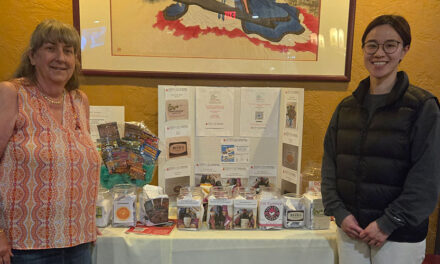Published August 13, 2020

TOWN MEETING with a twist. Over 200 voters, spaced six feet apart in the open air of the football field, made their opinions known on whether the town should purchase Seven Acres Poultry Farm Saturday. The measure failed to secure the required 2/3rds majority, with 116 in favor, 87 opposed. (Maureen Doherty Photo)
By MAUREEN DOHERTY
NORTH READING — A simple majority of voters attending Saturday’s Special Town Meeting was not enough to enable the town to move forward with the purchase of the Seven Acres Poultry Farm at 14 Concord St.
By a vote of 116 in favor and 87 opposed, the measure failed because the $1.12 million real estate transaction for the 14 acres of land required a two-thirds majority of the voters present to approve it.
With the failure of Article 1, there was no need for the voters to take action on Article 2 so it was passed over. Article 2 was a request for $980,000 to potentially purchase two adjacent parcels also owned by the Magliozzis, each just under one acre, one a single-family farmhouse with attached market and the other a two-family with a v-shaped barn. Combined, all three parcels have over 500 feet of frontage on Concord Street near the intersection of Park Street West and Southwick Road.
All of the land is zoned residential. It abuts Bobcat of Boston, the Ipswich River and residential parcels on Park Street.
Held outdoors at the Arthur J. Kenney Athletic Field due to concerns over COVID-19, after multiple postponements and venue changes a total of 214 voters ultimately participated in the Special Town Meeting where they were seated on the field in chairs spaced six feet apart. It took about 25 minutes extra time to get all the voters checked in and situated. Police Chief Michael Murphy and Fire Chief Don Stats served as microphone runners for the audience members, wiping them off with disinfecting wipes between speakers.
The 14-acre parcel was put up for sale by the Magliozzi family in January after being farmed by the family for over 80 years. Under the state’s Ch. 61A law, which greatly reduces taxes to assist farmers in maintaining agricultural uses, the town is given the right of first refusal when it is put on the open market with a bona fide offer. In 2020, the town was taxing the property at about $3,400 and the three barn buildings at around $04,000.
The purchase and sales agreement must be shared with the town. Sergio Coviello, of 55 Spruce Road, a 39-year resident of the town, holds a P&S agreement with Paul Magliozzi through the Concord Street Realty Trust to purchase the property for $1.1 million. This property has about 114 feet of frontage on Concord Street. He would like to move his electrical business to the site. He has been involved with the town’s recreation committee for decades and has also indicated he would consider using some of the property for a multi-sport facility. He has a contingency to purchase two adjacent parcels owned by the Magliozzis, each for $450,000, which is why the town may have also had the opportunity to “step into the shoes of the buyer” and purchase those parcels as well, at the market rate offered. These sale prices were non-negotiable and deemed valid. The extra $80,000 in Article 2 the town requested was to cover relocation expenses for the family and to take down the buildings. Article 1 had an extra $20,000 included to raze the three large barns.
Coviello pointed out that his strong ties to the community extend beyond himself as all three of his sons and their wives live in town and they are raising their families here.
The 90-minute debate was roughly split between those opposed to the town taking on ownership of more land and those who believe that the pending retirement from farming by the Magliozzi family represents a once in a lifetime opportunity for the town to secure the destiny of one of the last large parcels in the town. At the very least the land could be banked, they said while the town determines its future uses, or it could be sold at a profit. Realtor Priscilla Fitzgerald, a resident since 1971 and a 45-year business owner in the town, said the town could not go wrong by purchasing it because land values in this town only go up, including several million dollar homes currently being built in the neighborhood.
Many residents speculated that the town has many unmet needs and if there is extra money available, it should be used to meet those needs, such as sidewalks and road repairs, and the COVID pandemic adds to those concerns. However, since the sale would be funded from the sale of town-owned land, specifically the $20M profit the town made after the J.T. Berry was sold to Pulte Homes for the development of 450 market-rate condominium units for buyers 55 and older, these funds cannot be used to pay for everyday town expenses or salaries.
Recommendations on the purchase varied among the town committees. The Select Board voted 4-1 in favor of Article 1, with Rich Wallner opposed and 3-2 in favor of Article 2, with Wallner and Chairwoman Kate Manupelli opposed. Manupelli spoke in favor of banking the land for open space, which she said the town can never have enough of.
Wallner gave a presentation outlining the many needs the town has already identified and been working toward for many years, including through the CPC’s updated master plan, the facilities use master plan committee, and the Economic Development Committee (EDC). These include the roughly $100M price tag on sewerage for the town’s commercial zones; the building of an intergenerational center with the help of state funds; the needs of the present fire station and possibly a future fire station on the west side of town; and a real Town Hall, which he pointed out if the converted Murphy School is not good enough for students, why should it be considered good enough for town hall employees?
Wallner also noted that these plans include developing a vibrant downtown for intergenerational uses, including the area in and around the Rte. 62/28 intersection near the current Ocean State Job Lots, with mixed use development that would encourage people to actually spend money in their own town on their entertainment and other needs (similar to the LIFE senior housing and MarketStreet type development in nearby Lynnfield).
Finance Committee Chairwoman Abby Hurlbut stated her board was opposed to the sale by a 5-2 vote. Though she voted in the minority to support the purchase she said wearing her other hat as chairwoman of the the Facilities Use Master Planning Committee, she said “this property does not fall within any of the current plans within the community… I am not sure we can afford it right now if we wish to accomplish the other things that the town wants to see happen…We can’t do everything.” She also wondered about the inadequate access to the 14 acres, which would need to be developed near the Bobcat of Boston side of the property.
“If we had a purpose for it and that furthered the strategic plans of the town I would be in favor of moving the money out of the CDs that are making very little money,” commented FinCom member Don Kelliher. “It is an opportunistic purchase. To say we do not know what we are going to do with it does not make sense,” he said, adding buying it for speculative purposes because sewer could come up Concord Street eventually “is foolish.”
School Committee Chairman Scott Buckley noted that his board voted 5-0 in favor of the purchase. Community Planning Commission Chairman Warren Pearce said three of his board’s five members were present when they debated the merits of the proposal and eventually voted 3-0 to support it. Pearce also pointed out that when the town originally acquired the entire JT Berry state hospital land the original plan was for it become “100% commercial” and what the town ultimately got was “100% residential” between the Edgewood Apartments 40B (406 units) and Martins Landing (450 units at market rate) as these proved to the highest and best uses for the land. Coviello’s proposal for any commercial use will require a trip back to a future Town Meeting to rezone the property, Pearce said. Otherwise, it will remain residentially zoned.
Margie Salt, representing the Land Utilization Committee (LUC), stated they were unanimously in favor of acquiring the land. “Every year people come to the LUC looking to expand…we can’t help them; we don’t have the land,” she said, adding “let’s not give up the chance to lose this valuable property…We can decide what the community needs and wants…and move forward.”
Rita Mullin said a majority of the Recreation Committee was in favor of the purchase and Chuck Carucci said a straw poll of the Housing Authority was in favor of the purchase.
Carucci added that the youth of the community has been well taken care of, explaining that he was a part of making sure the town’s money was spent improving its schools as a member of the SSBC, including the $123M for the middle/high school. Now, he advised, it is time for the town to take care of its senior citizens with decent senior housing because the seniors can no longer afford to live in their own homes here. The town’s only senior housing units under the Housing Authority (HA) are 40 one-bedroom units at Peabody Court built 55 years ago in the town center. The HA also oversees four units of housing on Swan Pond Road.
Michelle O’Connor, a resident for 15 years and a business owner, in town did not favor spending the funds. She pointed out that she knows Mr. Coviello and she supported his proposal to develop the land and get it on the tax rolls. Many of Coviello’s friends and neighbors spoke highly of his character and felt he would be a trustworthy steward of the land. They were eager for it to return to being fully taxed and providing revenue to the town.
Jodi DeCleene, of Oakland Road, a 26-year resident of the town, recommended that voters take this opportunity to do something of value for the west side of town, which serves as a gateway to the town off Rte. 93. She also pointed out the traffic hazards of this three-way unsignalized intersection, which serves as a cut-through to Rte 28.
Owning all of the parcels, with 500-plus feet of frontage near this intersection could provide an opportunity to make it safer. DeCleene added that for those who criticized the fact that the town had not yet identified a use for the land money would not need to be spent demolishing the buildings because it remains a working farm, therefore, the town could lease it while deciding what to do with it.
Diane Welch attended the meeting with her father. She said her parents have resided on Concord Street for 61 years and her family felt strongly that the town should buy the land, even if just to bank it for now.
“I think this is an opportunity we can’t let be wasted,” Welch said. “Concord Street has gone through a huge evolution. It was smaller than Swan Pond Rd. and the houses were developed without the county letting the new residents know there was an easement on their properties, and the residents lost a significant part of their front yards (when the road was widened),” she recalled.
Welch noted that Coviello would be moving his business to 14 Concord Street from another property on Concord Street but said she recently surveyed the street and saw at least six developed properties that are currently vacant. “It would be a shame to see another commercial space there,” she said.
Select Board member Steve O’Leary explained the purchase in simple terms: Instead of having $20M in bank CDs earning low interest the town would have $18M invested in CDs and $2M invested in land that a town where it is known to go up in value and that could be sold if it needed to be.







